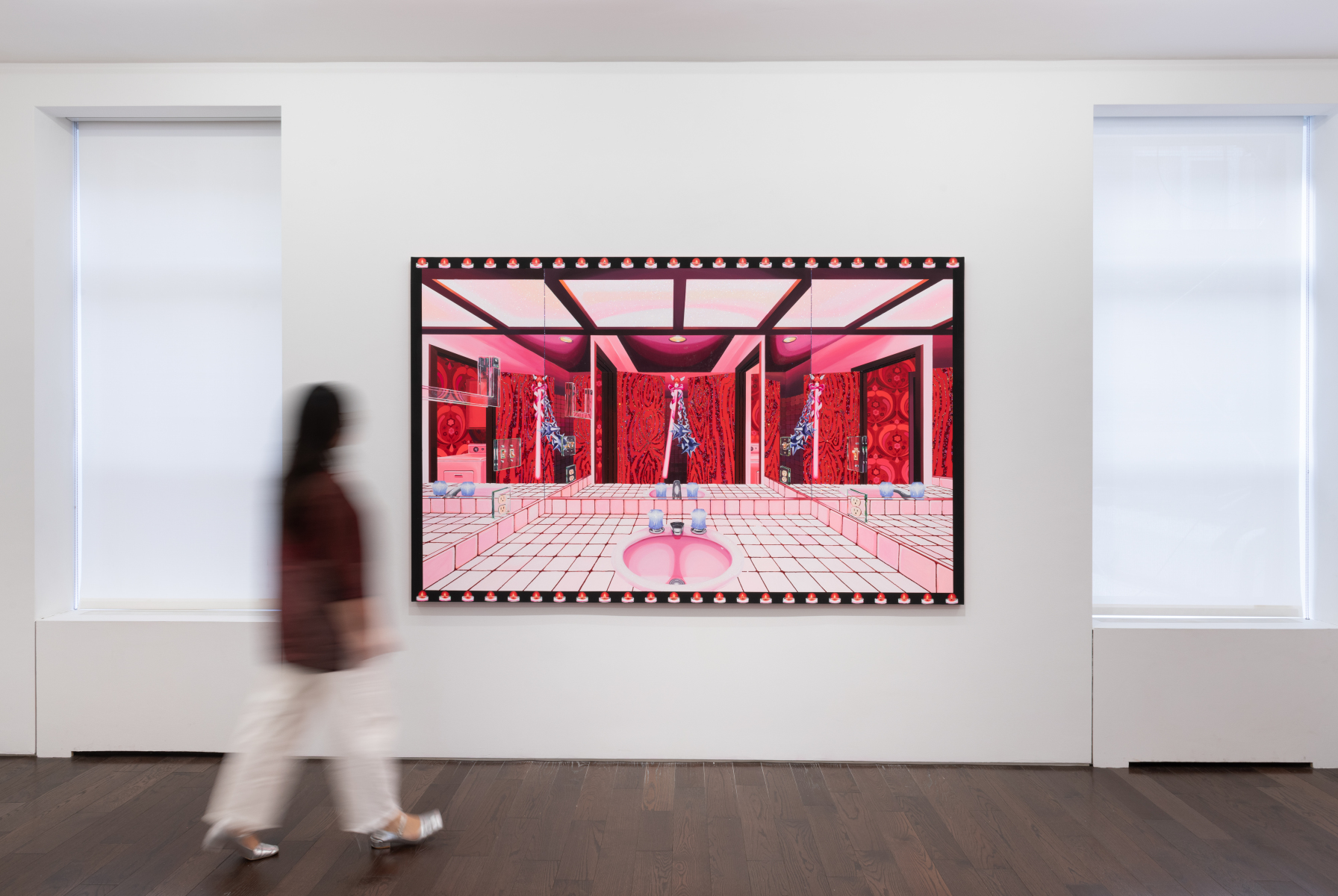Rachael Tarravechia
Water on Velvet
May 08 - June 14, 2024
Rachael Tarravechia
Water on Velvet
May 08 - June 14, 2024
Water on Velvet
After Rachael Tarravechia starts her laptop, she opens a new tab on her browser and directs it to zillow.com. She zooms out from her apartment in Brooklyn and pans west, gliding over the seamless digital map until she arrives in the arid terrain of the southwest United States. Descending from her bird’s-eye perspective, Tarravechia enters homes she will never see in a part of the world she has never visited. Virtually walking through these homes she seeks out their bathrooms, clicking until the camera stands in their center. Looking around, Tarravechia delights in the ability to act as a voyeur in another’s space but cannot shake an underlying feeling of dread. After years of intentionally restricting her eating and constantly bodychecking herself in bathroom mirrors, these spaces, which should prioritize hygiene and self-care, have become tainted with malice and discomfort. Endlessly repeating tiles are a symbol of the daily rituals performed to abstain from eating. The privacy of bathrooms becomes a shame screen for the eating disorder. The overwhelming focus on mirrors is an inescapable invitation to examine and criticize her body. Tarravechia takes a few screenshots of these remote spaces that feel so familiar to her, closes the browser, and turns to her canvas. Now, she has what she needs to begin painting.
Depictions of bathrooms have been a mainstay of Tarravechia’s studio practice for years. Their universality creates an easy access point for viewers, while their connotations of the beauty industry, personal aesthetics, and routine allow Tarravechia to capture her fraught relationships with femininity, pleasure, and fantasy. Embellishment is abundant in these artworks. From inlaid rhinestones to painted glitter to decorative borders, each artwork dazzles in near unreality. Undeniably eye-catching, the artworks glimmer in the limelight yet are devoid of traces of humanity. Trashcans are empty voids, sinks are bone dry, counters are uncluttered. The embellishment, at first so glamorous, now seems like a mask used to cover up sterileenvironments. In what ways are women pressured to cover up, embellish, and sterilize themselves beyond the bathroom? Why do traces of the feminine body need to be erased and removed?
The obvious aberration to these environments is the central placement of weapons. Showcasing a wide arsenal, including guillotines, flails, and barbed wire, these razor-sharp objectsupend the comfort of these traditionally palliative settings. Recalling Marina Abramovic’s performance Rhythm 0 (1974), the viewer is faced with the questions “What is this weapon doing here?” and “What could I use this for?” Many times, the weapons are floating or laying in the midground, a looming threat. Other times, the weapons are foregrounded, overlapping and crisscrossing a candy-colored background – the promise of pleasure is guarded and laced with latent violence. Even in the comfort of their homes, can women ever experience uncomplicated pleasure?
Many of the weapons are recognizable pieces of popular culture. As a casual video game player, Tarravechia enjoys playing Final Fantasy, a game series known for its mythical and enchanting weaponry. Tarravechia translates some of the games’ weapons from digital space to pictorial space, offering the fantasticalarms to the viewer. Although still potentially lethal, the fantasy weapons offer an alternative to the narrative of pain. In the game series, these mythical weapons are only offered to the protagonist, the “chosen one” – characters who possess qualities that elevate them above their comrades. Only these hyperreal individuals can use these weapons on the path toward defeating evil. Shown within the artworks, these weapons present the same potential, albeit with a different goal. The constant need to cover up flaws doesn’t need to be a minimizing act of erasure. The inability to experience uncomplicated pleasure doesn’t need to be an individual problem. An eating disorder doesn’t need to be a shameful, isolating act. These painful experiences could be the site for reclamation of femininity, pleasure, and fantasy.
Leia Genis, February 2024
Artist : Rachael Tarravechia
Visitor Information
Ceysson & Bénétière
956 Madison Avenue
10021 New York
T: +1 646 678 3717














